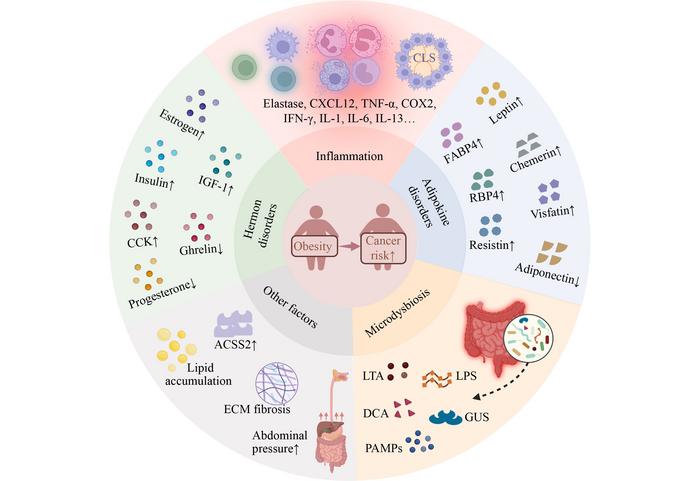
Obesity has emerged as one of the most pressing health concerns of our time, acting as a key risk factor for the development of various types of cancer. As we delve deeper into the biological mechanisms at play, we uncover a multitude of pathways that link obesity to cancer pathogenesis. The complexity of this relationship is underpinned by biological, environmental, and lifestyle factors that intertwine to create a unique, challenging landscape for both patients and healthcare providers alike.
Chronic low-grade inflammation represents one of the central features of obesity and serves as a pivotal mechanism in cancer development. Adipose tissue in obese individuals becomes infiltrated by immune cells that promote a pro-inflammatory environment, leading to elevated cytokine production. These inflammatory markers can contribute not only to the progression of obesity but also to the mutagenic processes associated with tumor formation. Therefore, understanding the extent and implications of inflammation in obesity could be critical in developing preventive strategies against obesity-related cancers.
Moreover, the hormonal milieu in obesity significantly influences cancer risk, particularly in individuals with altered endocrine function. For instance, elevated estrogen levels resulting from increased adipose tissue can play a considerable role in the etiology of breast and endometrial cancers, especially in postmenopausal women. The connection between hormones and cancer is multifactorial, pointing to the intricacies involved in hormonal signaling pathways that may either promote or inhibit tumor growth. A comprehensive understanding of these hormonal interactions could illuminate potential therapeutic targets.
Compounding this, the gut microbiota has been shown to undergo dysregulation in the context of obesity. This dysbiosis not only exacerbates inflammatory processes but also alters the metabolism of dietary components, producing metabolites that may influence cellular behavior and tumor growth. Research into gut microbiota and its interactions with obesity presents a fascinating area of investigation, as it could reveal novel insights into the preventive strategies for obesity-related cancers. Future interventions targeting the gut microbiome may offer the promise of reducing cancer risk.
Adipokines, the bioactive compounds secreted by adipose tissue, also play a significant role in the complex interplay between obesity and cancer. Leptin and adiponectin are two critical adipokines that have been shown to have opposing effects on cancer cell proliferation. Elevated levels of leptin can promote tumor growth, while adiponectin is often regarded as protective against cancer progression. The imbalance of these adipokines in obesity raises questions about potential therapeutic avenues through modulation of their levels to mitigate cancer risk.
Physical stressors related to obesity, such as increased abdominal pressure, further complicate the cancer risk landscape. These physical factors can induce mechanical stress on tissues and promote the development of interstitial fibrosis, which may foster an environment conducive to tumor initiation and progression. Understanding these physical stimuli and their biological implications can shed light on potential interventions aimed at reducing the overall burden of obesity-linked cancer.
In light of these connections, effective strategies for the prevention of obesity-related cancers are of utmost importance. Weight management is critical, and strategies include dietary modifications, increased physical activity, bariatric surgery, and pharmacotherapy. Adopting a low-fat, low-carbohydrate, or Mediterranean-style diet has been documented to reduce inflammation and oxidative stress, both recognized contributors to cancer risk. Encouraging physical activity can help normalize immune function and metabolism, thus further mitigating chronic inflammation.
Bariatric surgery has emerged as a transformative intervention for severely obese individuals, demonstrating profound effects not only on weight loss but also on cancer incidence. The metabolic effects following bariatric surgery can lead to significant hormonal changes that may lower cancer risk, underscoring the importance of surgical options in managing obesity and preventing its complications.
Pharmacological interventions present additional avenues for addressing obesity-related cancer risk. Emerging weight-loss medications and drugs aimed at specific oncogenic pathways provide alternative strategies for those who may not be suitable candidates for surgical interventions. These pharmacotherapeutic approaches highlight the importance of a multifaceted treatment paradigm that encompasses not only weight management but also direct targeting of cancer pathways influenced by obesity.
As we endeavor to develop personalized prevention and treatment strategies, it becomes increasingly clear that a deeper understanding of the interplay between obesity and cancer is essential. Questions about the dichotomy between hereditary and acquired obesity, the impact of aging on cancer risk, and how these factors intertwine to create a feedback loop involving gut microbiota dysbiosis require focused research.
The nuances uncovered in the relationship between obesity and cancer risk compel us to expand our investigative efforts. Longitudinal studies exploring these complex interactions and assessing various intervention strategies’ differential effects on cancer development are imperative. As our understanding of these multifaceted relationships grows, we can pave the way for more precise and personalized intervention strategies tailored to patients’ unique biological profiles.
In conclusion, the intricate association between obesity and cancer warrants a multi-pronged approach. By focusing on lifestyle modifications complemented by pharmacological strategies and surgical interventions, healthcare providers can empower patients to lower their cancer risk associated with obesity. Continued research into the underlying mechanisms, preventive strategies, and treatment options will not only enhance our understanding but also facilitate the reduction of the substantial burden that obesity-related cancers impose on individuals and healthcare systems worldwide.
Subject of Research: Not applicable
Article Title: Novel perspectives on the link between obesity and cancer risk: from mechanisms to clinical implications
News Publication Date: 13-Nov-2024
Web References: Journal Link
References: Not applicable
Image Credits: Credit: Xiaoye Shi, Aimin Jiang, Zhengang Qiu, Anqi Lin, Zaoqu Liu, Lingxuan Zhu, Weiming Mou, Quan Cheng, Jian Zhang, Kai Miao, Peng Luo
Keywords: Obesity, Cancer, Prevention, Inflammation, Gut Microbiota, Adipokines, Hormonal Imbalance, Bariatric Surgery, Pharmacotherapy, Lifestyle Modifications, Oncogenic Pathways.





